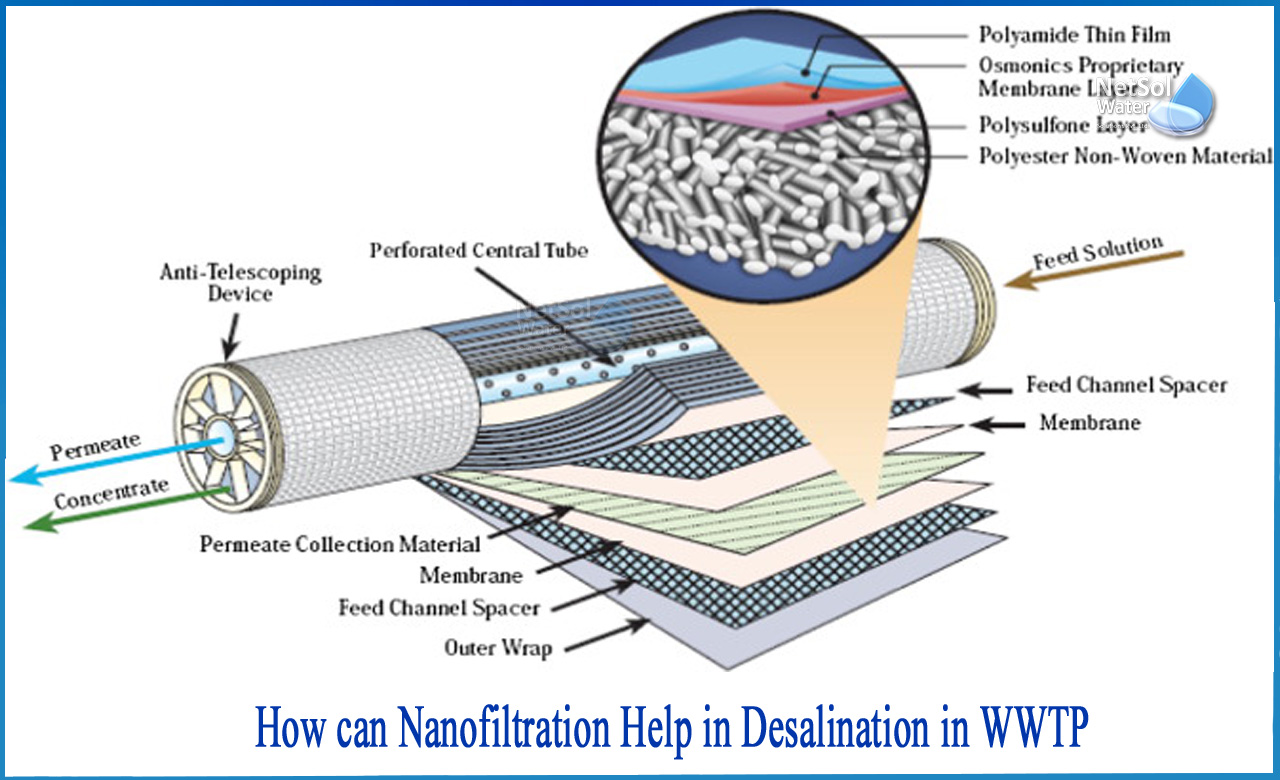How can Nanofiltration help in desalination in WWTP?
One of the most important efforts in the wastewater treatment sector is Nano filtration membrane (NF). It is a newer advancement in membrane technology that can be either aqueous or non-aqueous. NF has properties that fall in between UF and RO, and it works through both pore-size flow (convective) and solution-diffusion mechanisms. Membrane charges, as well as surface negative charges, play a significant role in membrane function. The NF approach is employed in a range of industrial water and wastewater treatment (WWT) applications. The main function of NF is to remove ions and organic compounds selectively, and it is employed in a few specific seawater desalination applications.
To preserve the membrane from damage due to its high cost, wastewater was processed using appropriate ways to remove most of the suspended or undissolved elements such as suspended solid, inorganic, and organic substances (recommendation all of the manufacturing membranes). Because residual contaminants are mostly dissolved heavy metals salts, we aim to enhance the molecular size of the pollutants in the treatment approach, then select the appropriate membrane filtration procedure for pollutants separation.
The methods employed
There are a variety of methods that may be used to limit the amount of pollutants that can foul NF membranes.
Filters, coagulation and precipitation procedures, oil/water separators, adsorbing resins, and a variety of other devices are among them. MF and UF are two newcomers to the realm of pre-treatment technologies;
MF is designed to remove suspended particles, while UF is aimed to remove dissolved macromolecules (organic). As previously stated, these technologies are accessible in a wide range of pore sizes and building materials.The basic science of membrane processes can be explained by heavy metals forming cationic forms that are initiallycomplexed by a bonding agent that increases the molecular weight of the bonded cations while also increasing the size of the molecule to a size greater than the pores of the membrane used for separation.
What are the advantages?
When compared to other traditional separation processes, membrane filtration has the following advantages: minimal energy needs, good separation selectivity, and rapid reaction kinetics.
One of the novel ways is the use of nanotechnology for water desalination. Nano filtration, a newly designed water purification technique, claims to be as successful as current methods while being more energy efficient and perhaps less expensive.
Conclusion
The Nano-unit is more energy efficient in terms of producing desalinated water (product water) per unit of electricity. As a result, Nano membrane uses approximately 29% less electricity. ANano filtration plant can generate desalinated water for 29% less money.
In terms of TDS, pH, SAR, cations (Ca. Mg, Na, and K), and anions, the quality of product water obtained with Nano filtration is good. It has a permeate water with relatively low salt concentration and an acidic pH.
The Nano filtration plant can be adjusted to accept any TDS water that is less than 600 ppm in quality. If the water is intended for crop irrigation, it can be calibrated to provide water with a TDS that matches the fluctuating tolerance of the crops, avoiding the removal of divalent cations such as Ca. and Mg, which are also plant nutrients.
Netsol Water is Greater Noida-based leading water & wastewater treatment plant manufacturer. We are industry's most demanding company based on client review and work quality. We are known as best commercial RO plant manufacturers, industrial RO plant manufacturer, sewage treatment plant manufacturer, Water Softener Plant Manufacturers and effluent treatment plant manufacturers. Apart from this 24x7 customer support is our USP. Call on +91-9650608473, or write us at enquiry@netsolwater.com for any support, inquiry or product-purchase related query.



